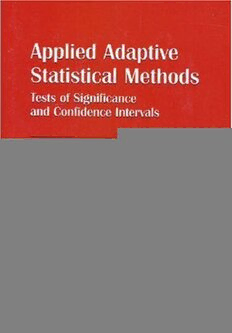
Applied Adaptive Statistical Methods: Tests of Significance and Confidence Intervals PDF
189 Pages·1987·19.617 MB·English
Most books are stored in the elastic cloud where traffic is expensive. For this reason, we have a limit on daily download.
Preview Applied Adaptive Statistical Methods: Tests of Significance and Confidence Intervals
Description:
ASA-SIAM Series on Statistics and Applied Probability 12 Adaptive statistical tests, developed over the last 30 years, are often more powerful than traditional tests of significance, but have not been widely used. To date, discussions of adaptive statistical methods have been scattered across the literature and generally do not include the computer programs necessary to make these adaptive methods a practical alternative to traditional statistical methods. Until recently, there has also not been a general approach to tests of significance and confidence intervals that could easily be applied in practice. Modern adaptive methods are more general than earlier methods and sufficient software has been developed to make adaptive tests easy to use for many real-world problems. Applied Adaptive Statistical Methods: Tests of Significance and Confidence Intervals introduces many of the practical adaptive statistical methods developed over the last 10 years and provides a comprehensive approach to tests of significance and confidence intervals. It shows how to make confidence intervals shorter and how to make tests of significance more powerful by using the data itself to select the most appropriate procedure. Adaptive tests can be used for testing the slope in a simple regression, testing several slopes in a multiple linear regression, and for the analysis of covariance. The increased power is achieved without compromising the validity of the test, by using adaptive methods of weighting observations and by using permutation techniques. An adaptive approach can also be taken to construct confidence intervals and to estimate the parameters in a linear model. Adaptive confidence intervals are often narrower than those obtained from traditional methods and maintain the same coverage probabilities. Numerous applied examples from the areas of biostatistics, health sciences, the pharmaceutical industry, agricultural sciences, education, and environmental science are included. The SAS macros discussed in the text are provided in the Appendix and can also be downloaded from the author’s website. Audience This book is written at an intermediate level; readers with a basic knowledge of multiple regression analysis should be able to understand the adaptive procedures. Some matrix algebra is used to describe the adaptive weighting methods. This book could be used as a supplementary text in courses on regression analysis.
See more
The list of books you might like
Most books are stored in the elastic cloud where traffic is expensive. For this reason, we have a limit on daily download.
